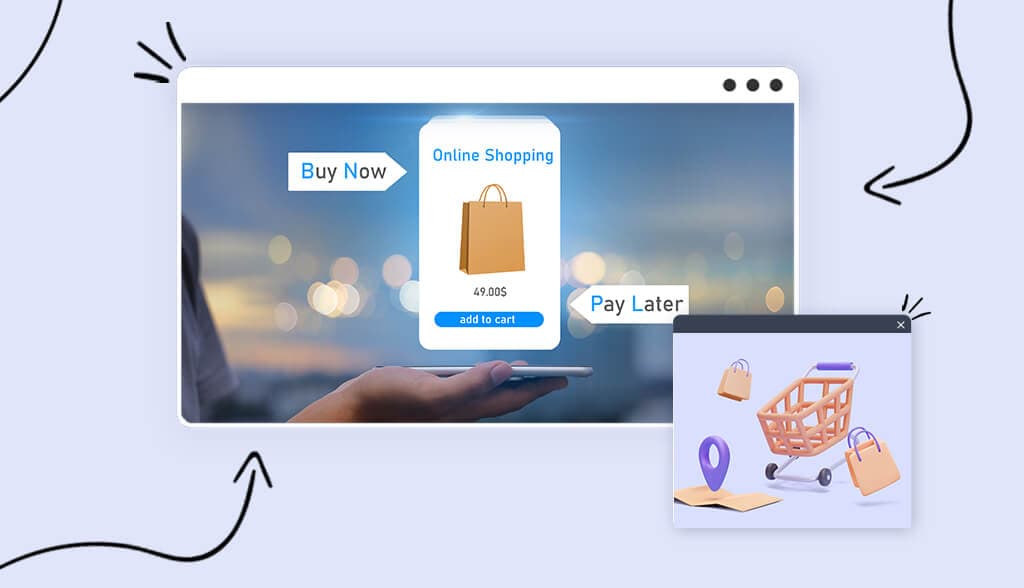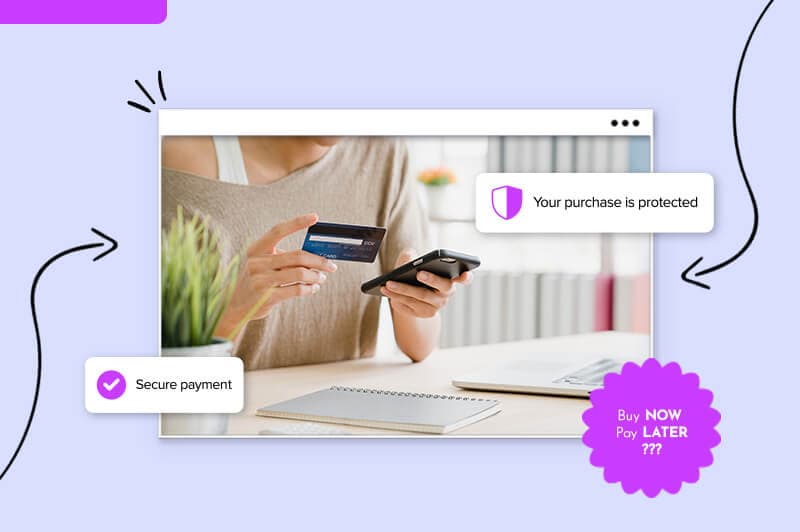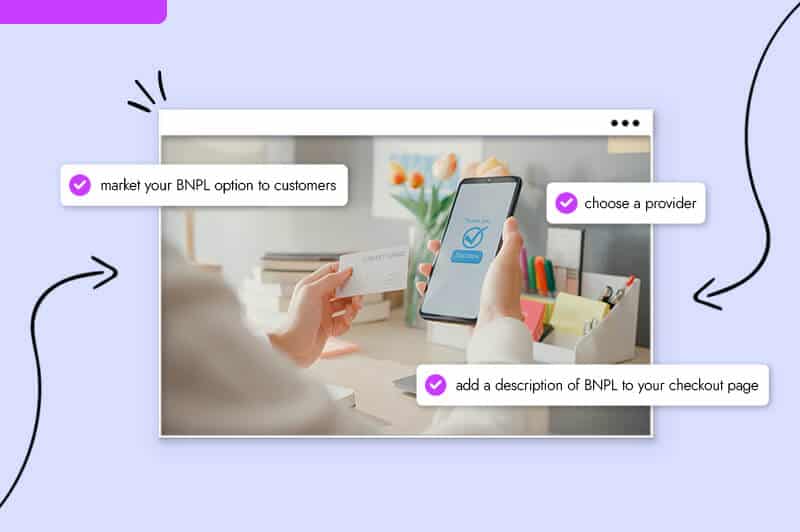
“I don’t have the money for it right now” is something you’ve probably heard as a business owner. But what if your customers didn’t need to have the money right away to buy your product/service?
“Buy Now, Pay Later” has been around for a while, but it’s just starting to gain popularity. In this post, we’re going to give you a rundown on what “Buy Now, Pay Later” is, its benefits and disadvantages, and how you can incorporate it into your business.
Just like the name sounds, “Buy Now, Pay Later” (or BNPL for short) lets customers make a purchase, receive it immediately, but pay for it later through installments.
It divides your customer’s purchase into a series of monthly payments, with the first due at checkout.
The remaining payments are then billed to the customer’s credit or debit card until the purchase is fully paid. BNPL payment plans come with interest rates and late fees but vary depending on the provider.
So, what does the BNPL payment system look like when your customer is purchasing your product/service?
When your customer is in the checkout, an option will appear to either pay the full amount or divide the payment into a smaller amount.
If the customer chooses the latter, they’ll fill out a quick application that’ll appear on the screen. It’ll ask for information like their full name, address, social security number, and phone number. Then, they’ll provide a payment method. The criteria will either be approved or denied.
If approved, the customer can now decide on the installment plan. While it depends on the provider, most offer a “pay-in-four” installment plan.
Here’s an example of how a “pay-in-four” plan works. If a customer makes a purchase of $100, they’ll pay $25 at checkout, and then $25 for the three remaining payments, each due two weeks apart.
However, just to remind you, this is just an example of one type of payment plan. Payment plans vary depending on the provider.

You may be wondering if you should consider offering BNPL to your customers. Let’s talk about some of the benefits of BNPL.
If your product or service is considered a bigger purchase, then BNPL can help increase sales by helping customers feel more comfortable.
If customers can spread out payments and reduce the financial impact of a purchase, they’ll be more likely to buy. They’ll get their order just like they would paying in full, but they can spread out the cost via BNPL. So, not only will this drive sales, but you’ll also appeal to a wider audience.
If your customers don’t have to pay the bill all at once, then they have more buying power.
The average order value (AOV) is the average amount a customer pays on a purchase. Offering BNPL payment options help customers avoid credit card interest and purchase products/services that wouldn’t typically be within budget.
While the customer doesn’t have to pay in full, your business still receives full payment for the purchase. So, it’s a win-win for your business and the customers.
BNPL has gained popularity since the pandemic with many businesses offering this payment service to customers. If you don’t offer this service but your competitors do, you’re losing out on potential business.
And if your competitors aren’t offering BNPL, offering this service will put you one step ahead of everyone else.
Nothing’s perfect, right? Just like other financing options, the BNPL has some disadvantages. Let’s take a look at them.
Providers offering BNPL payment services charge both the customer and merchant. Of course, the fees vary among providers, but BNPL typically incurs higher fees ranging between 2-6% of the total purchase amount.
Like anything new, there can be issues when integrating BNPL into your preexisting payment system. For some, it can be a breeze, but for others, it may take some trial and error to get it up and running smoothly.
Not every business is approved to offer BNPL payment plans. Businesses must meet specific criteria to qualify (criteria varies depending on the provider). In addition, specific businesses, like gaming and tobacco businesses, are not qualified for BNPL.
I don’t want to waste your time – you have a business to run! So, let’s cut to the chase and talk about the common challenges small business owners face and the ways to overcome them. You ready?

After learning what BNPL is and whether it’s right for your business, you’ve decided to go ahead and offer this payment option to your customers. But what do you need to do to get it up and running on your website?
That’s why we’re here! Here are the steps to follow for your business to offer BNPL.
The first thing you need to do is choose a provider. As the popularity of BNPL continues to grow, you’ll see more and more providers popping up. But you want to choose one that you trust and offers the best rates.
While you can choose who you wish to do business with, I recommend sticking with companies that have a solid reputation in the industry.
Here are some reputable BNPL companies:
Compare BNPL companies to see which offers the best payment options, rates, and fees. After you choose which BNPL company to work with, fill out an application and see if your business qualifies for BNPL.
Now that you have BNPL set up on your website, it’s time to let customers know you offer this new payment option.
Marketing your new payment option to your customers will allow them to make larger purchases and drive sales. Here are some of the ways to gain eyes on your BNPL payment option:
These marketing tactics will help bring awareness about BNPL and encourage customers to try it out.
I mentioned this above, but I’m going to talk about it in depth because it’s an important step.
When customers are adding items to their shopping cart, the bill adds up quickly. And once they see the final amount, many will abandon the cart. But including a BNPL message in the checkout, encourages customers to complete the purchase.
You want the BNPL option to stand out. So, make sure it’s clearly visible next to other payment options and you have an exit popup mentioning the BNPL payment option to increase sales.
Just remember, you won’t really know what’s working unless you look at the data (which we’re just about to talk about).
Like anything on your website, it’s important to track how effective your BNPL strategy is.
By looking at the data (Google Analytics is a great option for this), you can understand what’s working and what’s not which will help you improve your marketing efforts.
For example, let’s say your checkout page doesn’t have a brief description of what BNPL is and you notice customers are leaving the checkout page before making a purchase. Adding a description may increase sales.
Or, it could be that customers like BNPL, but leave before making a purchase. This could mean they don’t trust/aren’t familiar with the BNPL providers. In this case, you could change providers to a recognizable one (like PayPal) and see if there’s a difference.
To figure out what steps to take, here are some of the metrics you should keep an eye on:
These metrics can help you understand what’s going on with your BNPL marketing and where the changes need to be made.
The BNPL payment option is a great option for small businesses to increase sales and give customers more buying power.
Now, all you need to do is choose the provider you want to work with and implement it onto your website. Then, you’ll be ready to go!
This portion of our website is for informational purposes only. Tailor Brands is not a law firm, and none of the information on this website constitutes or is intended to convey legal advice. All statements, opinions, recommendations, and conclusions are solely the expression of the author and provided on an as-is basis. Accordingly, Tailor Brands is not responsible for the information and/or its accuracy or completeness. It also does not indicate any affiliation between Tailor Brands and any other brands, services or logos.
Products
Resources
@2024 Copyright Tailor Brands